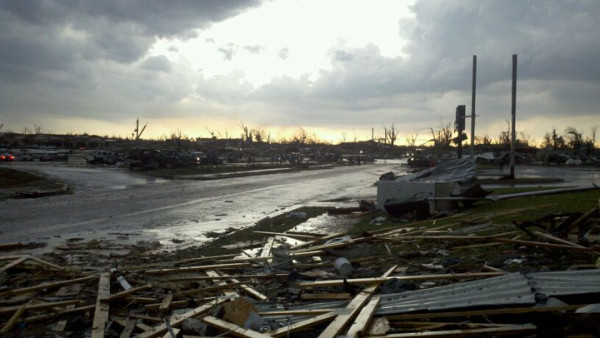
What may begin to tip the scales toward acknowledgement of climate change is not the extremity of weather events but their number. If it becomes evident that the number of extreme weather events is increasing, the case for climate change will grow stronger. During the last few years wide scale flooding often accompanied by unusual rain events has appeared to increase. There have been large scale floods in Pakistan, Australia, Europe, and the United States, during the last couple of years. Currently the Mississippi River is flooding and the flood is either the largest in recorded history or the second largest. In addition, in 2010 an extreme rain event 9a thousand year Rain event) triggered flooding in Nashville, Tennessee, and in 2009 an even more unusual rain event (a 10,000 year rain event) triggered flooding in Atlanta, Georgia.
In addition to flooding and rain events, there has been an unusual number of Tornadoes. As of May 23, there have been 1,170 tornadoes reported in the US in 2011. This number includes at several confirmed rare F 5 tornadoes. Three confirmed F 5 tornados occurred on April 27th 2011:
* From Smithville, MS to Shottsville, AL along a 32 mile path* From Hackleburg, AL to Huntland, TN along a 132 mile path* In or near Philadelphia, Mississippi along a 29 mile path
Monstrous F 4 or F 5 storms which devastated Tuscaloosa, Alabama, and Joplin, Missouri also occurred during the Spring of 2011.
In addition to extreme rain events, floods and tornadoes, we need to consider droughts and heat waves. In 2007 the Intergovernmental Panel on Climate Change Fourth Assessment Report (IPCC, 2007) noted,
Since 1950, the number of heat waves has increased and widespread increases have occurred in the numbers of warm nights. The extent of regions affected by droughts has also increased as precipitation over land has marginally decreased while evaporation has increased due to warmer conditions. Generally, numbers of heavy daily precipitation events that lead to flooding have increased, but not everywhere. Tropical storm and hurricane frequencies vary considerably from year to year, but evidence suggests substantial increases in intensity and duration since the 1970s.In the extratropics, variations in tracks and intensity of storms reflect variations in major features of the atmospheric circulation, such a
Not only did the IPCC note an increase in the number of extreme weather and climate events during the last 60 years, but foresaw a continuation of this pattern for the rest of this century.
The IPCC forecasts extreme rain and flood events due to increased precipitation that will cause:
* Damage to crops; soil erosion, inability to cultivate land, water logging of soilsWe cannot be sure yet that the IPCC forecast is coming to pass, but the evidence from the last couple of years strongly suggests that it is. If this pattern continues it is only a matter of time before the public recognizes the full implication of what is happening. At that point even the extreme political right may start indulging in climate alarmism. The real Joplin tragedy may turn out to be that we are not without responsibility for the disaster, yet unwilling to acknowledge our responsibility for it. The time is coming when we will acknowledge it.
* Adverse effects on quality of surface and groundwater; contamination of water supply
* Deaths, injuries, infectious diseases, allergies and dermatitis from floods and landslides
* Disruption of settlements, commerce, transport and societies due to flooding; pressures on urban and rural infrastructures










8 comments:
Yawn.
The number of reported tornados in the U.S. has been steadily declining for several decades as temperatures have risen. This is precisely what the GCM's predict should happen. This year's terrible outbreaks are an anomaly like 1974's were an anomaly.
The models also predict fewer hurricanes, although there the results seem dubious to me - sub-hurricane storm incidence is supposed to rise, but right at 74mph there's supposed to be a huge decline, then an increase up to about current levels for the most powerful hurricanes.
I would respectfully submit that our models aren't really good enough to predict the effects of higher polar temperatures, even on continental scale.
Duncan I doubt that the insurance companies share your lack of concern. Insurance payouts for extreme weather claims have been recently 5 times higher than they were in the 1980's.
Thermometers tell about global warming,not weather.Conflating the two is arguable and unproductive.
Anonymous, In the case of extreme weather events, a pattern of increased extreme weather events may be produced by climate change.
Charles, sorry, but I thought localized weather events, whether they be cold and snow or heat and rain, were to not be misconstrued as indicative of global climate responses or predictors.
One needn't be on either the "extreme political right" or left, for that matter, to share that consideration.
Doc DocForesight, Climate refers to patterns of local weather ebents. When the patterns of weather events change significantly and on a global scale, we mar refer to that as climate change.
OK Charles, but if these weather events subside over the next few years and the local climate returns to a more historically normal pattern, what will you say then?
Doc, I would admit that I was wrong. Are the climate skeptics capable of admitting that they are wrong?
Post a Comment